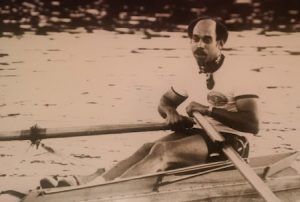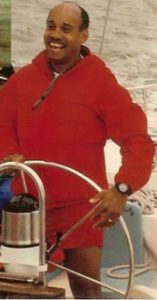September 16, 2022 ADDENDUM to the Original Profile Published November 20, 2020
IN MEMORIAM
JOHN IZZARD
5/26/1942 – 9/9/2022
With deep regret, personal sorrow, and heartfelt condolences to Parthenia, his wife of 33 years, I mourn the recent passing of my good friend John Izzard. Yet, like every member of his diverse legion of friends, I also feel honored and privileged to have known him. John’s unique and memorable voice has now been silenced, and a steadfast seeker of lifelong learning and master of wide-ranging skill sets – many of them officially certified – has now passed on. Yet, his compassionate and career-long mentoring of thousands of young minds from various backgrounds truly amounts to an admirable and lasting legacy.
Below is a link to my full profile of John.
~ Christopher Blackwall
John Izzard is first and foremost a modern-day life-long learner, an inquisitive student of history and ardent disciple of the iconic ancient Greek philosophers Aristotle and Socrates.
 Aristotle’s gift to his students – both ancient and modern – is the concept that a life well lived requires maintaining a healthy balance between worthy philosophical ideals and a wide array of practical skills. Socrates’ gift to posterity, meanwhile, is his well-known “method” of analyzing problems through reasoned in-depth discussion, on account of which he is justly regarded as the father of critical thinking.
Aristotle’s gift to his students – both ancient and modern – is the concept that a life well lived requires maintaining a healthy balance between worthy philosophical ideals and a wide array of practical skills. Socrates’ gift to posterity, meanwhile, is his well-known “method” of analyzing problems through reasoned in-depth discussion, on account of which he is justly regarded as the father of critical thinking.
But John’s commitment to life-long learning is not only driven by history, in which he majored at Cheyney University, graduating in 1968, along with minors in Special Education and Science. He is equally an avid student of his own times; and throughout his still active journey has enjoyed the benefit of many a mentor. Out of this long list, two individuals of the modern era stand out.
The first is his late father, a professional tailor, and a schoolteacher, as were his mother and a sister. In addition to teaching John some essential tailoring skills, his father encouraged him, from an early age, not only to study hard in school but also to participate continuously in after-school sports and self-improvement activities and programs.
John took these lessons to heart and, better yet, made them habitual. As a six-year-old, he quickly became adept at navigating the bus routes of Philadelphia; and throughout his development as a youth and adult, he amassed an awesome list of diverse abilities, many of them certified. Notable examples are a black belt in the Japanese martial art discipline Shotokan Karate, and certification as a welder.

His second, equally outstanding modern-day mentor is Jim Barker. Jim’s longtime achievements as a fiercely competitive lightweight sculler and highly respected coach are widely known in American rowing circles. They are also formally and permanently recognized through Jim’s elevation to the National Rowing Hall of Fame, among many other honors.
John’s collaboration with Jim, however, did not begin with John’s later entry into the world of rowing. Rather, it began years earlier, when they briefly met by chance, officiating hard-fought games in a local basketball league based in a tough Philadelphia neighborhood. If a team lost a “squeaker” at the buzzer, its protagonists would immediately focus their anger on the officials. Several narrow escapes ensued.
So, how did John, a certified and accomplished instructor of dinghy sailing, canoeing, and kayaking in many locations including Philadelphia’s Schuylkill River, finally become involved in rowing? The answer is through a chance encounter in 1973, which John relates as follows.
“One day a business contact, Charlie Agner, who owned and ran a hardware store and knew I was a welder, asked me to evaluate some wrought iron that he had acquired. As I gave him my assessment, the conversation somehow turned to my passion for water sports. He asked me if I had ever tried sculling, to which I replied, ‘what’s that?’ ‘Here’s the deal,’ said Charlie. ‘I’m inviting you to meet me Tuesday at the Undine Barge Club on Boathouse Row. I will put you afloat in a racing single. If you’re still upright after taking two full strokes and clearing the oars, I’ll reward you — and your date — with a full seafood dinner at Old Original Bookbinder’s. But if you fall in, the tab for that dinner is on you!’ I took one stroke, tried to clear the oars, and immediately rolled over…”
Of course, always being up for a challenge, John determined to become a success at this new sport and quickly got hooked on sculling. And who was his coach at Undine? None other than Jim Barker.
Throughout his forty years as head coach at Undine, a measure of the respect accorded to Jim by all his many athletes, is that all of them, whether high schoolers or national team aspirants, always addressed him, or referred to him, as “Mr. Barker.” And in turn “Mr. Barker” always made it crystal clear to every sculler in his squad that they were there to learn how to race, not socialize.
Jim’s disciplined ethos was of great appeal to both the philosophical and practical sides of John, and in due course his relationship with Jim deepened from coaching into one of long-term moral support and mentorship.
Evidence of this is abundant. When John first joined Undine as a regular rowing member, Jim advised him to just be himself, and accurately predicted that he would soon feel welcomed by his clubmates.

In 1978, sponsored by Jim, John was elected a full voting member of Undine. And when John’s son, John Izzard III, began to show an interest in sculling, Jim personally coached him all the way to becoming the 1986 Philadelphia High School and Catholic League youth single sculling champion.
In 2007, John was appointed Captain of Undine, thereby becoming the first Black person to hold such a position in any the clubs of the Schuylkill Navy. More recently, John also served as Vice President of Undine in 2016-17; and today, but for COVID-19, he and his wife Parthenia would again be volunteering their services as licensed rowing referees at various local regattas, including the Head of the Schuylkill.
But John’s impressive list of personal accomplishments are only half his total story. The other half is a multitude of examples of the ways he has given back as an instructor, a teacher and mentor. His professional life has been every bit as diverse as his education, and a repeating theme of his mentoring, professionally and as a volunteer, has been a keen focus on helping young people to succeed, as illustrated by the following excerpts from his lengthy and varied job résumé.
In 1968 John was hired as physical education director by the YMCA of Greater Philadelphia; and in 1970 became a Probation Parole officer for the City of Philadelphia. In 1974 – 76 John served as a counselor in the Philadelphia Youth Development Center of the Commonwealth of Pennsylvania.
For 28 years beginning in 1976 and continuing through to his retirement in 2004, John served in a variety of capacities as an educator in the School District of Philadelphia. His assignments in several different schools included physical education instructor, classroom teacher, substitute teacher and vice principal. In effect, for the entirety of his tenure, he was “on call wherever needed.”
At several points in his career, John received citations from the City of Philadelphia and the Commonwealth of Pennsylvania, recognizing his excellent work with students and at-risk youth.
John has spent his retirement as productively as ever, enjoying the opportunity and time to travel and to freely enjoy a range of recreational interests. A naturally gifted and fearless athlete, John has had more than his fair share of challenging experiences, some of them long term, such as high-level downhill skiing; and others equally thrilling but more daredevil in nature, such as motor racing and sky diving.
Nevertheless, continuing his interest in inspiring young people, a few years ago he and Parthenia established an annual award to a Philadelphia-area high-school rower who has achieved excellence both on the water and in the classroom.
And when asked for his personal goals once we are all free of pandemic restrictions, John quips that he hopes to “still be skiing and riding my motorcycle.”
~Christopher Blackwall
We are celebrating the HOSR’s 50th anniversary by highlighting 50 legendary competitors/crews/teams/coaches/influencers that have catapulted the regatta into a fall classic over the last 50 years. This list could never be exhaustive, but will be representative of the breadth of competition, and the culture, of the HOSR. This is an opportunity to hear the stories of the legends that have made the Schuylkill River and Boathouse Row so important to the greater rowing community, and special in our hearts. We celebrate the people by passing down their stories through generations, and affecting change for the future of our sport. We will publish a new story each week, continuing the celebration of our 50th anniversary, leading up to the 2021 regatta.
